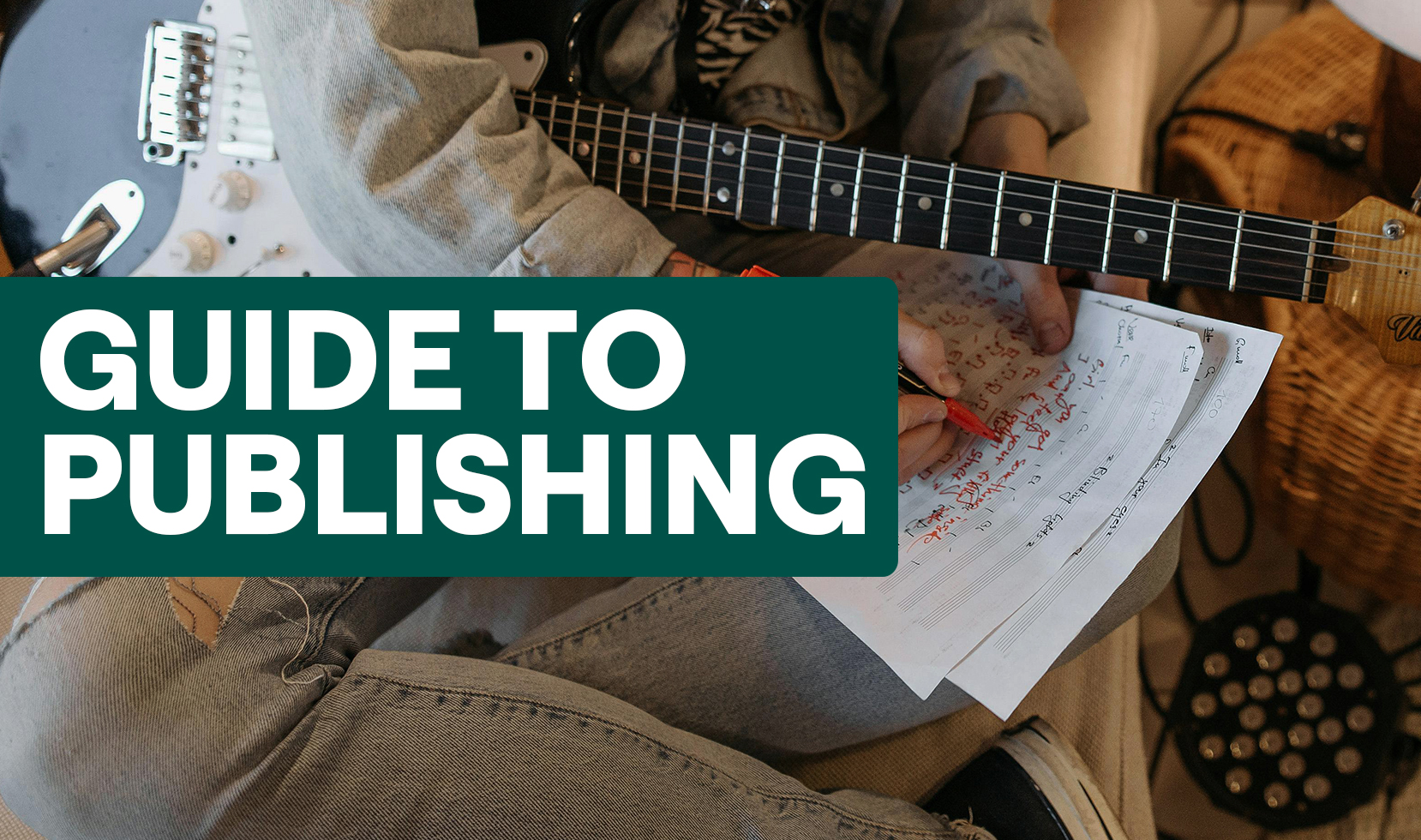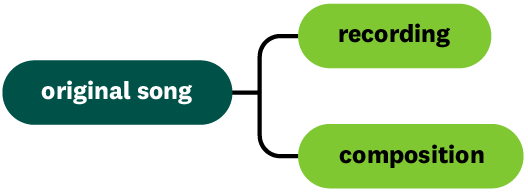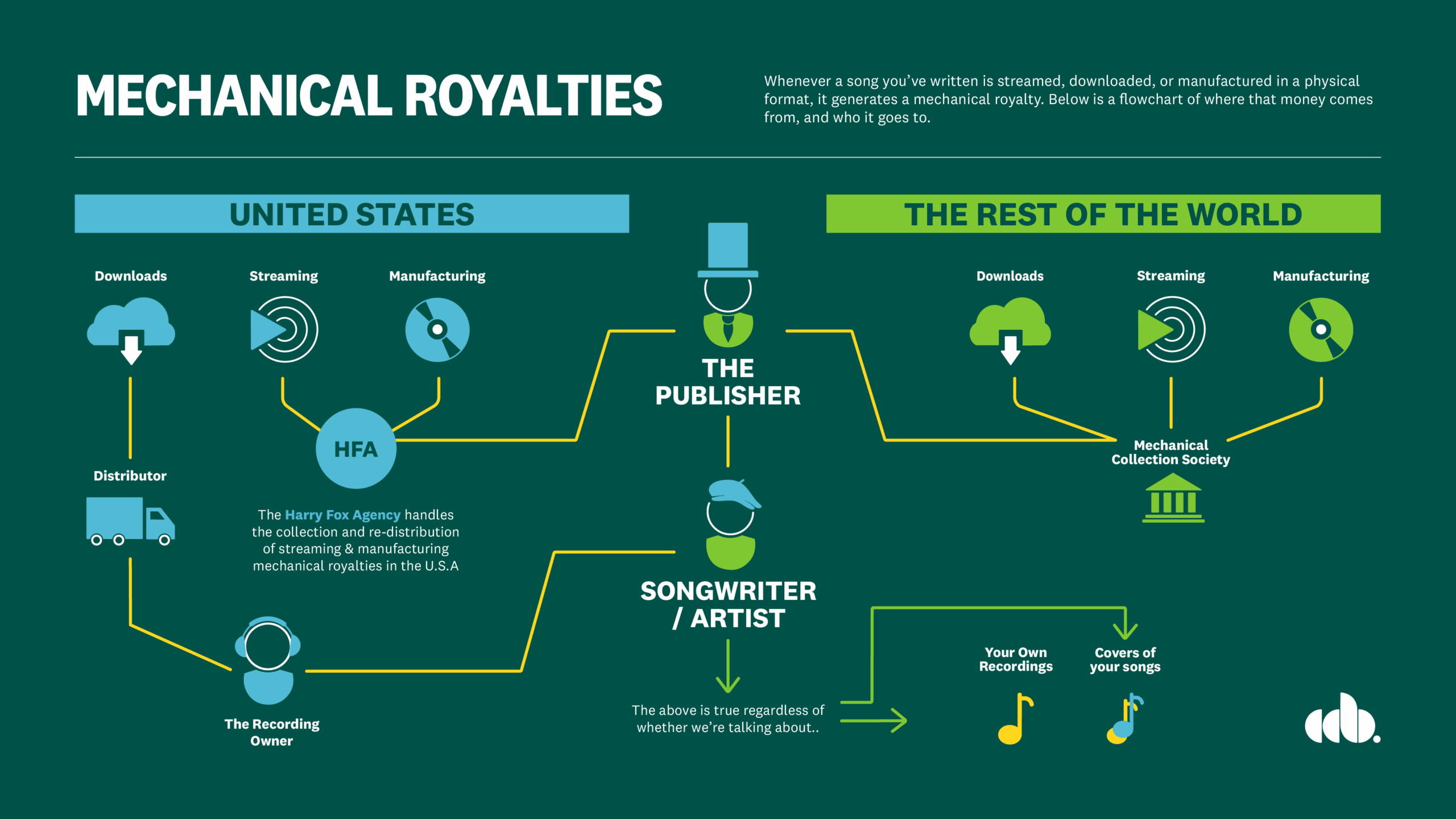
Ever recognize a song in a movie and wonder how it got there? Or listen to a cover version and wonder what the original songwriter earns from it? Maybe you’re an independent musician looking to make more money from your songs, and someone suggested music publishing—but you’re not sure where to begin.
In this blog, we’ll break down everything you need to know about music publishing and how it works. Read on for practical tips to start collecting your royalties and maximizing the value of your music.
Understanding Music copyright
To understand music publishing, it’s important to first understand the type of copyright it’s based on. Every song has two copyrights: the musical work (the composition) and the sound recording (the recorded performance). Publishing focuses on the musical work.
Musical work (or Composition)
A musical work is the song’s underlying composition—the music, lyrics, and melody that comprise the song.
Sound Recording
A sound recording is the recorded performance of that song, stored on something like a CD or digital file, also known as a “phonorecord.” Sound recordings can be created by performers, producers, or others involved in the recording process.

Understanding Music Royalties
Music royalties are payments made to the rights holders (like songwriters, artists, and publishers) for the use of their music, ensuring fair compensation for their work.
These payments are tied to the copyrights of a song and are generated through various commercial uses, including streaming on digital platforms, physical sales, radio airplay, and synchronization in visual media like films and TV.
There are several main types of music royalties, including Mechanical Royalties (for reproduction), Performance Royalties (for public use), and Synchronization Royalties (for use within visual media). Ahead of diving into those, we’ll tie up this introductory discussion to explain what music publishing is.
What is music publishing?
Music publishing helps protect your rights as a songwriter and ensures you get paid when your songs are used.
Publishing focuses on the composition of a song (the melody and lyrics), which can earn two main types of royalties: mechanical (from streams, downloads, and physical sales) and performance (from radio play, live shows, and public use). These royalties go beyond what you earn from streaming platforms through your distributor.
Publishing administrator services (like CD Baby’s CDB Boost) can help independent artists collect these royalties and license their music for use in film, TV, ads, and video games, unlocking valuable income streams.
Why does music publishing matter?
Latest data from the National Music Publishers Association shows revenue from music publishing is growing almost 5 times faster than revenue from recorded music — expanding the opportunities for artists to earn more money from their music. If you’re an independent artist, now is the ideal time to tap into this expanding source of passive income.
But many artists are still missing out. Each year, millions in royalties go unclaimed and end up in the industry’s “royalty black box” because of missing metadata or unregistered songwriters.
You can ensure you’re not leaving money on the table by using a royalty collection tool like CD Baby’s CDB Boost.
What types of royalties can I earn from music publishing?
When you distribute your recorded music to streaming services, you earn royalties based on digital streams. If you distribute through CD Baby, we automatically collect those royalties for you. But there are more royalties you can earn from your music, which a publishing administrator can help you collect.
Mechanical royalties
Mechanical royalties are paid to artists whenever a copyrighted composition is reproduced or distributed, whether physically (vinyl, CDs) or digitally. While the term comes from manufacturing physical media like CDs or vinyl, today most mechanical royalties come from interactive streaming — when a listener chooses to play a song on demand. Therefore, non-interactive streams (like Pandora radio) don’t generate mechanicals.
Performance royalties
When a song you composed is played in public – via a live performance or on the radio or through speakers at a restaurant – that “performance” generates a corresponding performance royalty.
Sync licensing fees
Sync licensing is the placement of music in other media, like a TV show, movie or advertisement. The “sync” part comes from the synchronization of music to the moving images. When a song you wrote is licensed for placement in other media, you are owed sync royalties. There are two types of royalties earned for this placement:
- The upfront placement fee: This is paid by the production company for the placement of your song and is only paid once.
- The sync royalties: Whenever media that contains your song is played, it generates a performance royalty. The TV network tracks those plays and files a cue sheet to report the play to your PRO, who then pays you the royalties.
How can I collect these royalties?
There are hundreds of collection societies around the world, each dealing with royalties generated from different uses—so a primary consideration is deciding what royalty streams are most relevant to your career and activity, then pursuing organizations accordingly.
Two of the most important, however, are Performance Rights Organizations (PROs) and the Mechanical Licensing Collective (MLC). There’s a good chance you’re already earning performance and mechanical royalties if you’re receiving streams on platforms or playing shows at registered venues — you just need to claim them!
Collecting performance royalties with Performance Rights Organizations
Performance Rights Organizations (PROs) such as the American Society of Composers, Authors, and Publishers (ASCAP) or Broadcast Music Inc. (BMI) collect royalties by issuing blanket licenses to businesses that use any music they represent.
A PRO essentially acts as an intermediary to license your music to businesses and users like venues and streaming services. This process simplifies copyright compliance for music users while ensuring creators are fairly compensated for their work, with PROs collecting license fees and paying them out to their members after deducting administrative costs.
How do PROs pay performance royalties?
PROs split performance royalties 50/50 between the songwriter and publisher.
Which performing rights organization (PRO) should I join?
Both ASCAP and BMI perform the same service of collecting royalties, so there is no “better” PRO between the two. The only difference between the two is that BMI does not charge for a songwriter affiliation while ASCAP charges $50 to affiliate as a songwriter. BMI does charge $150 to create a publisher, while ASCAP charges $50 to affiliate as a publisher. ASCAP also requires you to affiliate a publisher to collect the publisher’s share of the royalties, while BMI allows songwriters to collect the publisher’s share directly.
SESAC is the third major PRO in the U.S. They are invite-only, so you must either be invited by them to join or a member must recommend you.
Collecting mechanical royalties with the Mechanical Licensing Collective
The Mechanical Licensing Collective (or MLC) is the U.S.-based Mechanical Rights Organization (MRO) designated by the U.S. Copyright Office to issue and administer the digital audio mechanical blanket license in accordance with the Music Modernization Act to digital streaming platforms in the United States. They are responsible for collecting mechanical royalties from streaming platforms in the U.S. This distinction is important, because the MLC does not collect international royalties. It will only collect royalties generated from streams in the U.S.
How do I join a mechanical agency?
The only mechanical agency in the U.S. is the Harry Fox Agency (HFA). Most artists know them from their licenses for cover songs, but HFA also collects mechanical royalties from digital platforms. All other countries have mechanical agencies, but most smaller countries combine them with the PRO so they are not separate entities like HFA is in the USA.
It is very difficult to join Harry Fox as an independent artist. Only publishers can affiliate with HFA and they require that publisher to have a large catalog of songs.
With CDB Boost, we’ll register your music with The MLC and help you earn “mechanical royalties” whenever your original songs are streamed in the United States.
How do I collect mechanical royalties?
Since only publishers can join a mechanical agency, mechanical royalties can only be paid to a publisher. CD Baby can help collect these royalties on your behalf.
This aspect of the publishing administration service is particularly beneficial to independent songwriters, not only because of the requirements to affiliate with HFA, but also because of the difficulty of collecting mechanical royalties internationally.
When someone buys a download of a song you wrote in the U.S., the digital service includes the resulting mechanical royalty with the revenue for the sound recording that they pay to the distributor (CD Baby, in this case).
This is different internationally. If someone buys a download of a song you wrote on a digital platform outside the U.S., that country’s mechanical agency collects the mechanical royalty. They hold onto that money until a publisher claims it.

What is sync licensing?
Sync licensing is the placement of music in other media, like a TV show, movie or advertisement. The “sync” part comes from the synchronization of music to the moving images. When a song you wrote is licensed for placement in other media, you are owed sync royalties. There are two types of royalties earned for this placement:
- The upfront placement fee: This is paid by the production company for the placement of your song and is only paid once.
- The sync royalties: Whenever media that contains your song is played, it generates a performance royalty. The TV network tracks those plays and files a cue sheet to report the play to your PRO, who then pay you the royalties.
How do I collect sync licensing royalties?
CD Baby has a music library of thousands of songs ready for placement. With CDB Boost, you’ll have the opportunity to get placed, reach new listeners, and earn upfront sync fees, performance royalties, or both!
We’ve placed songs from independent artists just like you in many major TV shows and commercials. More and more music supervisors are seeking music from CD Baby because we boast a large catalog of music that can be licensed without the red tape of major label interference. Since opting in to sync licensing with CD Baby means the artist owns both copyrights (the composition and the sound recording), music supervisors have learned that licensing through us is quick and easy because they can clear all of the rights in one place.
What if I collaborated or co-wrote a song with other artists?
When your publishing royalty reports come in, CD Baby will detail which songwriter is owed what amount of the revenue. It is then your responsibility as the account holder to pay those songwriters their share. Keep in mind that this is only the publisher’s share of the royalties, since the PROs will pay the songwriters’ shares directly to them.
Fill out splitsheets ahead of your releases to document each songwriter’s share of royalties.
How do I credit other songwriters?
If you wrote your composition with other songwriters, you’ll want to complete a split sheet form. This will secure in writing who wrote what percentage of each song, adding up to 100%. A split sheet is a clean, easy way of declaring who is owed what when royalties start to come in.
How to start collecting royalties on your music through publishing
STEP 1: Release your music through an online distributor (such as CD Baby) to be placed on streaming platforms (Spotify, Apple Music, etc.) and digital download stores (iTunes). Your distributor will pay you recording revenue as your songs are streamed and downloaded.
STEP 2:Register your compositions with a Performing Rights Organization such as ASCAP or BMI to collect your performance royalties.
STEP 3: Sign up CD Baby Boost to simplify royalty collection and unlock new revenue opportunities.CDB Boost ensures your royalties are automatically collected from The MLC and SoundExchange—the leading neighboring rights organization worldwide—while also giving your music eligibility for sync licensing opportunities. CD Baby’s Sync Licensing team has secured thousands of placements across HBO, Netflix, major TV networks and film studios, advertising catalogs, and more.
FAQ:
At what point do I need publishing or a publisher?
Global registration and royalty collection begins when your songs begin to see significant streaming and royalty activity. But, you can still utilize a publishing administrator to help monitor your song’s activity and alert you when they are ready for global registration.
Does a publishing administrator replace my PRO?
A publishing administrator does not replace your PRO. In fact, songwriters must have a PRO affiliation before registering with a publishing administrator, who will then help manage your catalog at that PRO.
What’s the difference between a publisher and a publishing administrator?
Music publishing administrators do not retain any ownership or creative control over the songs they administer. Traditional publishers often require you to forfeit a percentage of ownership in exchange for creative services and promotion.
Are there other royalties I can earn?
The music industry is an ever-evolving business. New methods of listening to music mean new avenues from which to earn revenue. For example, what about satellite and Internet radio like SiriusXM and Pandora? These are technically radio stations like regular old terrestrial AM/FM radio, but they operate differently. While the PROs pay performance royalties to songwriters and publishers for airplay on terrestrial radio, royalties from airplay on satellite and Internet radio are payable to artists and labels since that revenue is generated by the sound recording copyright.
The revenue generated from airplay on satellite and Internet radio is collected by SoundExchange, who splits royalties 50/50 between the artist and the label. Think of it as a digital performance royalty, with the performing artist(s) and label being entitled to that revenue the same way songwriters and publishers are to AM/FM radio airplay. If you’re getting rotation on satellite and Internet radio, we suggest you create an account with SoundExchange to collect those royalties. CD Baby has an agreement with them to collect any unclaimed label royalties from them, but you will need to affiliate with them as an artist and register your songs to claim the artist’s share.
